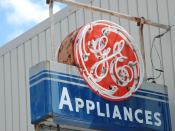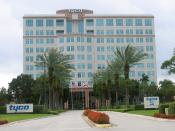General Electric and Tyco International are classified as conglomerates each approaching their business with a different strategy that generate different financial results. The results below for both GE and Tyco include common shareholders equity, market capitalization, net profits margins for the last 5 years, average net profit margin, market to book ratio along with net income and return on equity.
$'s in billion(s) GE& - TYCO
Common shareholders Equity $109 $32
Market Cap $377 $58
Net profit Margins (Dec)
2005 12.2% 8.1%
2004 12.1% 7.7%
2003 12.2% 2.6%
2002 11.5% -8.2%
2001 11.2% 11.5%
Average net profit margin 11.8% 4.3%
Market to book ratio 346% 181%
Net Income $16 $3
Return on equity 15% 9%
In looking at both GE's and Tyco's market-to-book ratios along with the return on equity shows that General Electric has done a much better job of providing greater shareholder wealth. The Market Capitalization for General Electric is about 377 billion dollars with common shareholders equity of 109 billion dollars.
When you divide Market Capitalization into common shareholders equity we arrive at 346% versus Tyco at 181%. The net income for General Electric is 16 billion versus Tyco at 3 billion. When the net income is divided by the common shareholders equity it shows that General Electric is able to provide a 15% return on equity compared to Tyco at 9% thus making GE more attractive. As an investor GE would be the company of choice when put up against Tyco since their percentage on return on equity is greater.
The average net profit over 5 years for General Electric is 11.8% compared to 4.3% for Tyco. When compared over the last 5 years General Electric has performed consistently and for the most part since 2001 has increased Net profit margins slightly, but more importantly delivered...


